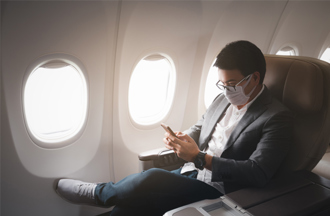
Translations:
Sanciones para los viajeros que rehusen llevar mascarilla (pdf)
Les voyageurs qui refusent de porter un couvre-visage sont passibles de sanctions (pdf)
国际航协:旅客在航空旅行中拒戴口罩将面临处罚风险 (pdf)
Geneva - The International Air Transport Association (IATA) is appealing to all travelers to wear face covering during the travel journey for the safety of all passengers and crew during COVID-19.
Wearing face coverings is a key recommendation of the International Civil Aviation Organization’s (ICAO) guidance for safe operations during the pandemic, as developed jointly with the World Health Organization and governments.
IATA is emphasizing the need for passengers to comply with the recommendation following recent reports of travelers refusing to wear a face covering during a flight. While this is confined to a very small number of individuals, some on-board incidents have become violent, resulting in costly and extremely inconvenient diversions to offload these passengers.
“This is a call for common sense and taking responsibility. The vast majority of travelers understand the importance of face covering both for themselves as well as for their fellow passengers, and airlines appreciate this collective effort. But a small minority create problems. Safety is at the core of aviation, and compliance with crew safety instructions is the law. Failure to comply can jeopardize a flight’s safety, disrupt the travel experience of other passengers and impact the work environment for crew,” said Alexandre de Juniac, IATA’s Director General and CEO.
Obligations under Conditions of Carriage
A plane ticket is a contract under which the passenger agrees to the airline’s terms and Conditions of Carriage. Those conditions can include the airline’s right to refuse carriage to a person whose behavior interferes with a flight, violates government regulations or causes other passengers to feel unsafe. Airlines also highlight the need to wear a face covering during the booking process, at check-in, at the gate and in onboard announcements.
Failure to comply means that a passenger faces the risk of being offloaded from their flight, restrictions on future carriage or penalties under national laws.
Face Covering is part of a layering of measures
According to tests at the University of Edinburgh, face covering, when properly worn, can cut the forward spread of potential COVID-19 droplets from the mouth by 90%.
“The research we have seen to date, and our own investigations with the world’s airlines, tell us that the risk of catching COVID-19 on a flight remains very low. There appears to be a number of factors supporting that. The high flow rate of cabin air from top to bottom, constant filtering of air through state-of-the-art HEPA filters, the fact that all seats face the same direction and of course wearing a face covering and sanitization of the aircraft all play a part,” said IATA’s Medical Advisor, Dr David Powell.
“This is not just about protecting yourself. It’s about protecting everyone else on the flight,” he said.
For more information:
Corporate Communications
Tel: +41 22 770 2967
Email: corpcomms@iata.org
Notes for Editors:
- IATA (International Air Transport Association) represents some 290 airlines comprising 82% of global air traffic.
- You can follow us at https://twitter.com/iata for announcements, policy positions, and other useful industry information.

